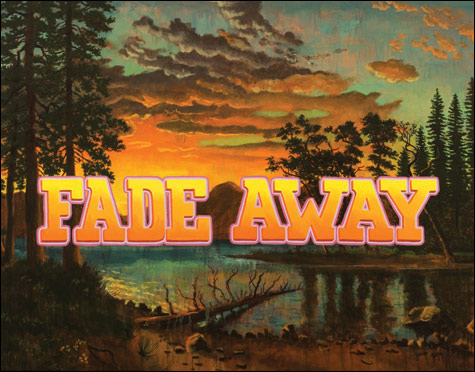
FADE AWAY: Joe Wardwell’s paintings are like the bastard children of swooning Hudson River School scenes and swaggering rock-album covers. |
“Joe Wardwell: Die Young” | LaMontagne Gallery, 555 East Second St, South Boston | Through October 10. “Andrew Mowbray: Tempest Prognosticator” | DeCordova Sculpture Park + Museum, 51 Sandy Pond Road, Lincoln | Through January 3 “Brian Knep: Exempla” | Tufts University Art Gallery, 40R Talbot Ave, Medford | Through November 15 “Drawings that Work: 21st Drawing Show” | Mills Gallery, Boston Center for the Arts, 539 Tremont St, Boston | Through October 25 |
One of the great themes in America is nostalgia for the "good old days," which flame into being and then fade into the distance. It's the anxiety that we've just missed the cool party, that paradise has been lost. And it's twinned with the idea that you better rush out and seize the day, because tomorrow it will all be over.It's often been tied to nature. It courses through the American landscapes of the 19th-century Hudson River School painters, canvases filled with nostalgia for a wild, "pure" America that the artists fear is being eaten up by the Industrial Revolution. It percolates through 19th-century Transcendentalism, as when Henry David Thoreau dashes into the Concord woods in the 1850s to "learn what it had to teach, and not, when I came to die, discover that I had not lived."
It's what F. Scott Fitzgerald is talking about at the end of The Great Gatsby when he writes that "Gatsby believed in the green light, the orgiastic future that year by year recedes before us." It's what Neil Young sings about: "It's better to burn out than fade away."
It's that theme — racing forward to get to the paradise in the rear-view mirror — that Boston painter Joe Wardwell taps in "Die Young" at LaMontagne Gallery. The canvases show rock lyrics (Black Sabbath, Slayer, Def Leppard) flaming across romantic landscapes — pictures like the bastard children of swooning Hudson River School scenes and swaggering rock-album covers.
Burn Out has the title in flaming blue and gold lettering floating in front of green surf crashing over rocks under a stormy sky. Wardwell paints with expressionist verve. The waves are built from lots of short, rushing strokes splashed with paint drips. The title seems to correspond to the crashing, disintegrating wave, and to amplify it.
Sometimes Wardwell's composition is off the mark, as when he lines everything up on center. And the neon words — which vary from ornate circus script to blocky B-horror-movie letters — mask some clunkiness in his landscape rendering. But then you see the glowing sunset over a mountain lake in Fade Away. The title floats in front of the scene in letters that shift from yellow to orange, rhyming with the disappearing light. It inspires a particularly acute heartache.
For Andrew Mowbray's new show at the DeCordova Sculpture Park Museum, "Tempest Prognosticator," the Dorchester conceptual artist sculpts giant, ornate, neo-Victorian weathervanes and an anemometer (that spinning-cup device that measures wind speed) out of white polyethylene (a plastic often used in cutting boards). The pieces look like Jules Verne designs manufactured by Matthew Barney.